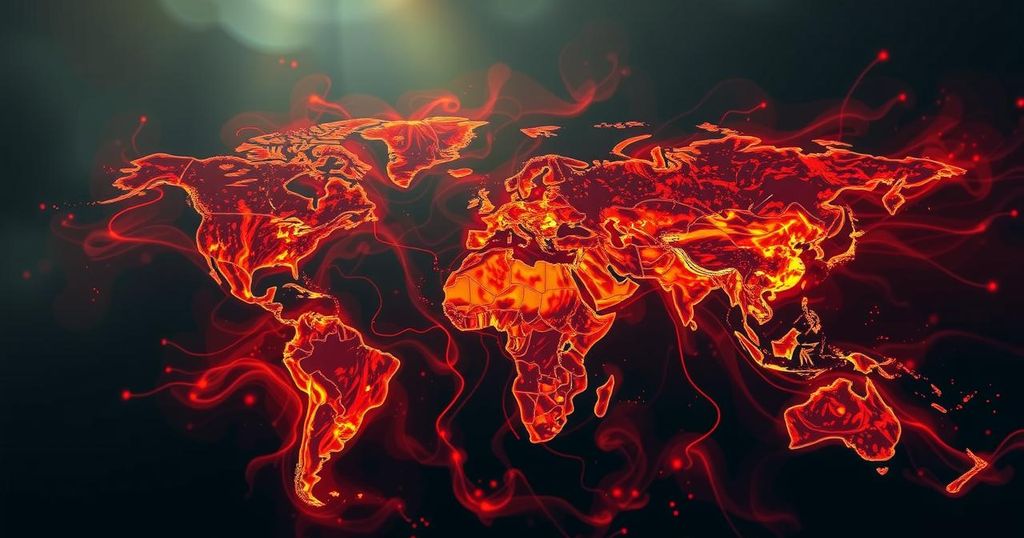Studies Highlight Climate Crisis as Catalyst for Unprecedented Heatwaves and Fatalities

Recent studies reveal that at least 24 previously impossible heatwaves have emerged globally due to human-induced climate change. These heat events have resulted in numerous regional fatalities and are significantly impacting communities worldwide. Research indicates that the consequences of global heating are exacerbating extreme weather occurrences, with estimates attributing millions of premature deaths to climate change-related impacts. The findings call for urgent action at climate summits to address rising emissions and protect vulnerable communities.
Recent studies indicate that at least 24 extreme heatwaves, previously deemed impossible, have occurred globally, underscoring the severe impacts of human-induced climate change. These heatwaves have caused numerous fatalities across continents including North America, Europe, and Asia, with analyses confirming that they would have been nearly impossible in the absence of additional heat from greenhouse gas emissions. According to estimates, the increased global temperatures have directly contributed to the premature deaths of millions, including thousands of infants. In total, analyses reveal that 550 instances of heatwaves, floods, storms, droughts, and wildfires have been exacerbated by climate change, highlighting only a fraction of the hidden toll of such disasters. This comprehensive assessment, compiled by Carbon Brief and presented in collaboration with the Guardian, provides substantial evidence that the climate crisis has immediate ramifications for communities worldwide. This research anticipates the potential devastation resulting from a rise in global temperatures of 2.5°C to 3.0°C, with scientists urging immediate action to mitigate carbon emissions and enhance community resilience against climate-related disasters. The foundational process of determining the influence of human activity on extreme weather, termed attribution science, has progressed from subtle detection of climate change’s fingerprints to a clear recognition of its significant impact. Dr. Joyce Kimutai, a researcher in the World Weather Attribution group, expressed the urgent need for increased funding to safeguard vulnerable communities affected by extreme weather. “The increasing role of climate change in the intensities of extreme weather events is definitely worrying,” she stated. Robert McSweeney from Carbon Brief reinforced the notion that the evidence available today reflects the real-time impact of human-caused climate change, necessitating action now, rather than postponing measures for the future. Records of extreme weather events reveal unprecedented heat occurrences across the globe. From the Mediterranean to Asia, these heatwaves have struck communities with a severity at odds with historical norms. The evidence from prior years shows that cities, infrastructure, and local conditions remain ill-prepared for these climate-induced extremes, which continue to escalate as fossil fuel emissions remain unchecked. The challenges posed by extreme weather events now encompass everything from public health crises to significant economic losses. Attribution studies have quantified the human cost and highlighted how climate changes have increased incidences of deaths and damages. In low to middle-income countries, it has been determined that one in three infants dying from extreme heat would have survived if not for climate change, equating to roughly 10,000 lost lives annually. Estimations indicate over 100,000 deaths per year are linked to heat-related incidents across 43 nations, marking a staggering toll attributed to the climate crisis. Furthermore, the financial implications of these disasters are expansive; for example, Hurricane Harvey resulted in unprecedented flooding of properties, with damages amounting to billions of dollars. Various infrastructure and agricultural challenges stemming from extreme weather further entail significant economic costs, illustrating the extensive impact of the climate crisis. The imperative to invest significantly in protective measures against extreme weather events is more urgent than ever as communities face worsening climatic conditions.
The topic at hand highlights the alarming consequences of climate change, with numerous studies documenting the rise of extreme weather events directly tied to global warming caused by fossil fuel emissions. It elaborates on the concept of ‘impossible heatwaves’—those that would not have occurred without human-induced climate changes—emphasizing the critical need for strategies to combat climate impacts. Attribution science plays a significant role in illustrating the human toll and economic repercussions of climate-related disasters, thereby establishing a clear link between rising temperatures and the increased frequency and intensity of these events. The findings call for immediate action to address carbon emissions and bolster community resilience as world leaders prepare for upcoming climate summits.
The compendium of studies underscores that climate change is no longer a distant threat; it is an ongoing crisis resulting in increased frequency and severity of extreme weather events worldwide. The implications are dire, with significant human fatalities, economic costs, and damage to basic sustenance avenues, necessitating urgent action to mitigate carbon emissions and improve community defenses against the escalating climate threats. As representatives gather for climate negotiations, the call for substantial financial commitments to protect vulnerable populations remains paramount, as the evidence indicates an alarming trajectory for our global climate if current trends continue.
Original Source: www.theguardian.com






